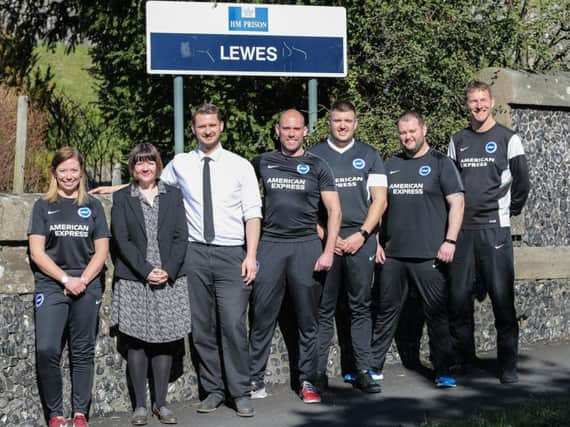Brighton & Hove Albion in campaign with Lewes Prison to tackle re-offending


It's signed up to the Twinning Project, a national campaign which aims to bring together professional football clubs and prisons across the UK to use football as a catalyst for change.
The focus is on providing opportunities to better prepare prisoners for release, help them find employment and ultimately reduce reoffending.
Advertisement
Hide AdAdvertisement
Hide AdBrighton & Hove Albion and Albion in the Community (AITC) have already begun working with HM Prison Lewes, with AITC staff visiting the prison two days a week for six weeks to work with a group of prisoners who were specially selected by prison staff.
Throughout that time AITC delivered a range of sporting qualifications and workshops, including the Level 2 Sports Leadership qualification and a course in behaviour change, with theory lessons in the morning and practical sessions each afternoon.
The hope is that these qualifications will boost participants’ prospects of finding paid employment upon release – something which research shows is a key factor in reducing reoffending and helping prisoners to rebuild their lives.
Rebecca Collins, leading on the project for AITC. She said: “We know that the popularity of football and Brighton & Hove Albion is fantastic tool in terms of engaging people in our work and encouraging them to think about changing their behaviour.
Advertisement
Hide AdAdvertisement
Hide Ad“It is an approach that can be incredibly successful and have a significant social impact. We have certainly seen our participants from HM Prison Lewes embrace the opportunity offered to them by this project and show a genuine commitment to moving away from criminal behaviour in favour of making a positive contribution to their local community.”
So far AITC has worked with 23 prisoners, with the most recent cohort starting at the end of February.
Paul Barber, chief executive and deputy chairman at Brighton & Hove Albion, said: “This is a fantastic campaign and something I am delighted the club and AITC can support.
“As a football club we are committed to supporting our local community and innovative projects like this are a great way for us to do just that.”
Advertisement
Hide AdAdvertisement
Hide AdMia Motter, deputy governor at HM Prison Lewes, added: “It has been inspirational to see the benefits to both the staff group and the residents who have been fortunate enough to take part on the courses that have been offered through the partnership between HMP Lewes and Brighton & Hove Albion.
“A lack of opportunity is too often a common theme for those whom we care for; the chance to be part of a team, learn and build on the skills developed as a result of these positive and meaningful interactions, should not be underestimated.”